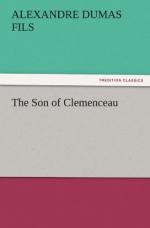Looking at the young man of two-and-twenty, Clemenceau knew by his own infatuation at the same tender age with the same woman, that he had nothing to forgive him for—little to reproach him. It was youth that was to blame, and it had loved. No matter who that Cytherean priestess was, he must have adored her whether sister, wife or daughter of dearest friend, teacher and paternal patron. But it was clear from the grief that had made the youth a melancholy man that he was honorable.
Grief is never, when the outcome of remorse, a useless or evil feeling. It is a fair-fighting adversary which has only to be overcome to be a sure ally, always ready to defend and protect its victor. In his own terse language, that of a mathematician and mechanician who knew no words of double meaning.
Clemenceau told the Italian this.
“With your youth and your grief, such a spirit as yours and such a friend as you have in me, Anto,” he said, “you possess the weapons of Achilles.”
Antonino thought he was mocking at him and frowned.
“You think I am sneering? Or merely laughing at you? Alas, it is a long while since I indulged in laughter. It was this woman, with whom you have fallen in love, who froze the laugh forever on my lips! she would have been the death of me if I had not overruled her and exterminated her within my breast. How I loved her! how I have suffered through her—enough to be our united portions of future pain—suffer you no more, therefore. You are too young, tender and credulous to try a fall with that creature. She must have divined long ago that you were enamored of her. She is not too clear-sighted in all things, but she sees such effects by intuition. It is very probable that she has returned to this house on your account, so suddenly. I could guess that she was on the eve of flight, but not that she would return. She always needs fresh sensations to make herself believe that she is alive, for she is more lifeless than those whom she robbed of life.”
Antonino did not understand the allusion, for he had never felt less like dying than since Cesarine had been seen again.
“I mean that she sends the chill of death into the soul, heart and brain of man, and it congeals the marrow in his bones!” said Clemenceau, energetically. “You may say that if she is a wicked woman and if, whatever her defense, her absence covers some evil step, I ought to separate from her. It is all the present state of the law allows. But while her absence would have prevented you, or another friend, from meeting her, still she would have borne my name. That name I am doubly bound to make honorable, for it was stained with blood—that of one of her ever-accursed race. My father won an illustrious name and, her ancestress, whom he married, was dragging it publically in the mud amid all the scandals of society, when he slew her on her couch of gilded infamy. Ashamed of this name—not




